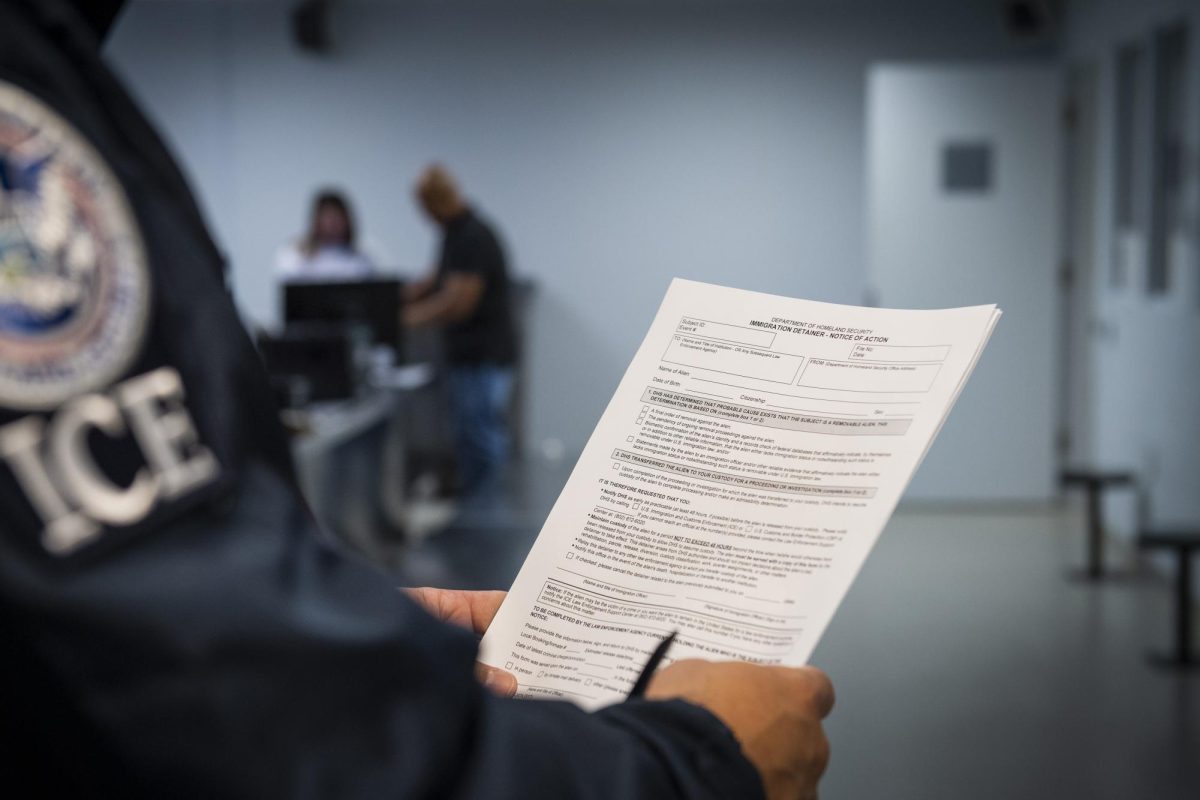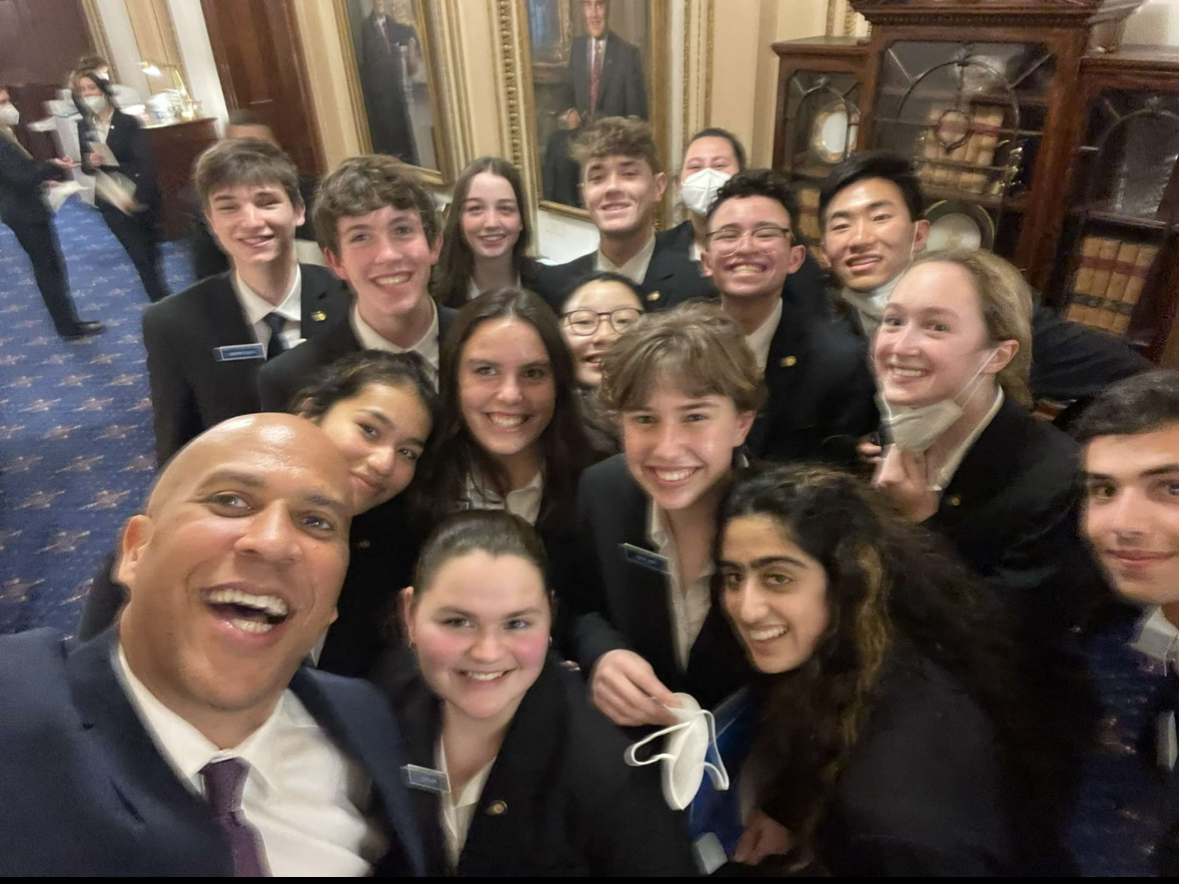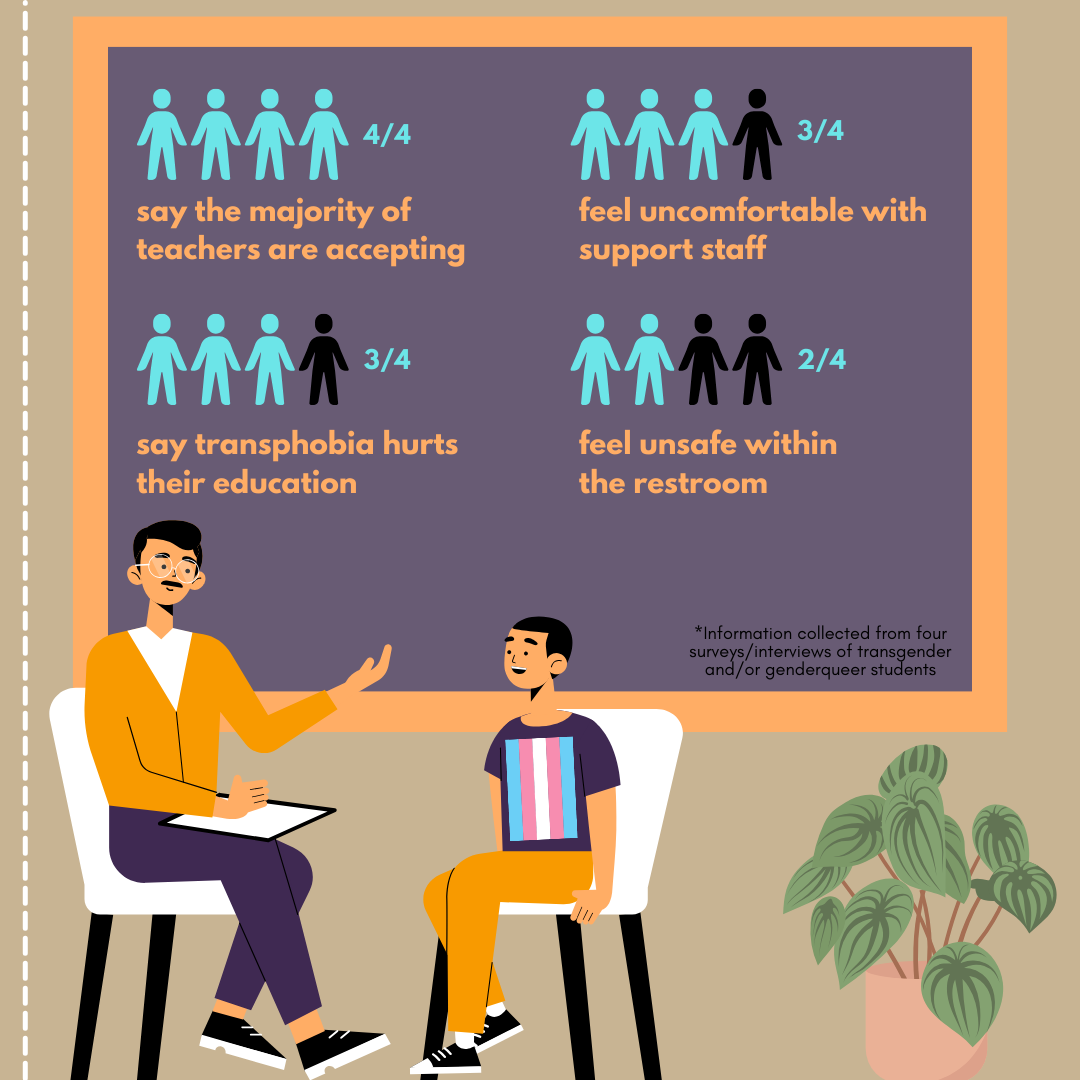Note: The terms transgender and genderqueer are used in tandem in this article to include both transgender people and those who don’t use the label transgender but are still considered outside the gender binary. These were selected because transgender is the most recognizable term within mainstream media, and because genderqueer was the term most favored by interviewed students.
*The names of students who wished to be anonymous have been changed and pseudonyms are indicated by an asterisk.
Bolded words and phrases are defined in the glossary at the end of the article.
In the past year, anti-trans legislation has been on the rise, and schools have become the battleground. An early adopter of these policies, Florida enacted the Parental Rights in Education Act in 2022, informally dubbed “Don’t Say Gay”, which restricts discussion of LGBTQ+ topics in schools. A month later, Alabama passed a law requiring teachers to out trans and genderqueer students to their parents. In August of this year, Missouri restricted gender-affirming care for youth. Many more states have been at the forefront of this legislation, while others like New York have designated themselves “safe havens” for transgender and genderqueer people leaving these states. The Williams Institute estimates that 3.0 percent of youth aged 13-17 in New York identify as transgender, and 1.4 percent nationwide. In this wide landscape, where does Monroe-Woodbury High School fit in?
For this article, four transgender and genderqueer students share their insights about their experiences during high school. Students were either interviewed in person or responded to a Google Form made available via Spectrum Club’s Google Classroom.
Student Behavior
The most common interactions a student will have in school are with other students. Accordingly, student attitude is often the deciding factor in the atmosphere for trans and genderqueer students. Monroe-Woodbury High School students’ behavior is described as a “mixed bag” of positive and negative interactions.
“Most of my peers make me feel judged since I am openly transgender; however, most teachers do make me feel accepted and not judged at all,” said Elenio Santiago, who goes by both Eloise and Elenio. He’s a transneutral and genderfluid student and departing president of Spectrum Club.
Among some unaccepting students, quiet judgment prevails, rather than outright harassment. Even without direct discrimination, this takes on a toll on mental health. A 2023 study in Transgender Health found that social acceptance from others greatly reduced suicide risk in transgender and nonbinary youth, who are already at four times greater risk of suicide than their cisgender counterparts. Peer acceptance was especially impactful.
Santiago discussed his experiences with his peers.
“Bullying, but not outright bullying. Like talking behind their backs and stuff. Being disrespectful and playing it off as a joke…it’s very emotionally distressing. School is already stressful enough, and dealing with your peers judging you makes it 20 times worse,” said Santiago.
These covert slights are more difficult to address with staff and administration than explicit bullying. Some transgender students desire more avenues for handling this type of prejudice.
“I think that there is little accountability that those who commit microaggressions or more serious forms of harassment are obligated to take, and that this is a serious issue,” said Levi*, a transmasculine student.
Levi suggested a reporting system that would out students to the minimum number of people necessary. He also proposed that information be made available to cisgender students on what constitutes harassment.
Would transphobic students even change in the face of proposed solutions? Santiago expressed doubt.
“It’s what their parents teach them; it’s instilled in their mind. So, they’re gonna believe what they’re gonna believe. You can educate them, but you can’t force them,” said Santiago.
At Monroe-Woodbury, the majority of students are described as accepting by transgender students. For students seeking to support trans and genderqueer students, suggestions range from privately checking who is safe to use their pronouns around to calling out transphobic behavior when they see it
Teacher Behavior
Teachers are another major facet of school life. They influence their classroom environment and act as watchdogs of bullying and harassment. Compared to the student body, teachers are described as more accepting by the students interviewed for this article.
“I’ve had very supportive classroom environments. All of my teachers have attempted to use my chosen name, with only the occasional slip-up,” said Emmanuel*, a transgender student.
What accounts for this difference? Alex*, a queer student, believes this is due to teachers being more mature than most students. In comparison, Santiago thinks this is because teachers have more responsibility to behave appropriately in school. Even so, not all interactions are universally positive.
“For the most part, teachers will gender me correctly or at least make an attempt—but I would like those who do not to attempt to listen when corrected regarding pronouns and identity terms and not steamroll over me or my parents,” said Levi, who has engaged in multiple email chains with teachers over consistent incorrect pronoun use.
Misgendering can hurt trans and genderqueer students. In New York, intentional misgendering can be cause for intervention by administration. In contrast, Montana and Tennessee decided in May 2023 that teachers can’t be compelled to use pronouns different from the child’s sex, even with parental permission.
To create a more supportive classroom environment, students made certain suggestions for teachers.
“I only come out to teachers who ask for preferred names and pronouns, but not all of them do, so I feel too shy to come out to all of them. Teachers should ask for preferred names and pronouns more,” said Santiago.
However, using preferred names and pronouns all the time can backfire if parents are unsupportive of their child’s gender identity. Children may be outed to or even punished by unsupportive parents if certain pronouns or names are used in the wrong context, such as parent-teacher conferences or email conversations.
“Not checking beforehand is incredibly dangerous and puts the onus on the student to either keep quiet about their gender around teachers or stress the importance of using the pronouns of the gender they were assigned at birth. Checking with students as to whether it is safe to use their correct identity terms should be a mandated practice, if it is not already,” said Levi.
According to Ms. Capul, teacher adviser for Spectrum Club, asking for identity terms is not mandated, but it is best practice for teachers.
Restrooms
No area in school is as private as the restrooms. For Monroe-Woodbury High School students, there is a male and female restroom on each floor, with entrances often watched by security guards. Additionally, there are at least four gender-neutral options.
Some states, like Florida, have banned using a restroom or changing facility inconsistent with one’s biological sex. In New York, students can use any restroom they want, due to gender identity and expression being a protected class under the Gender Expression Non-Discrimination Act (GENDA). Students cannot be forced to use a single-occupancy restroom either.
“These protections are mandated, but they cannot be completely secure on the social side of things.” said Alex.
Trans and genderqueer individuals may fear being antagonized or even assaulted by people who believe they are using the wrong restroom. A 2019 study in Pediatrics found that when restricted to certain restrooms, transgender teens are at greater risk of sexual assault. The four Monroe-Woodbury High School students were split on whether they had issues accessing the restroom, with two feeling unsafe in both male and female restrooms.
For these students, gender-neutral restrooms may be an option. According to Vice Principal Mr. McElroy, locations in Monroe-Woodbury High School include the nurse’s office and the visiting team’s locker room. The transgender students interviewed for this article were unaware of these options. Additionally, there are gender-neutral restrooms on C floor and D floor that require students to notify a security guard to unlock them. For some, this can be an uncomfortable or embarrassing interaction.
When students interviewed in person were told about these options, reactions were mixed.
“I feel like that’s okay, but not many people know about it, and their names suggest that’s not a function they have,” said Alex.
There are four total floors in Monroe-Woodbury High School, with the nurse’s office on A floor and the visiting team’s locker room on B floor.
“I’m glad gender-neutral restrooms for students are existent, but unfortunately, both of these options are so out of the way that I doubt I’d be able to use them in any of my classes. I do wish there were more convenient options–it’s rather disappointing,” said Levi.
“I don’t feel comfortable using the bathrooms and locker rooms of either my chosen gender or my gender assigned at birth… I think M-W needs to make gender-neutral bathrooms more accessible for students,” said Emmanuel.
Implementing new restroom options can be difficult when buildings lack dedicated spaces or already have gendered options. Monroe-Woodbury administration does check in with physical education staff on this situation.
“Some feel like they have the choice, and then others choose the options and don’t feel comfortable in either space. So, it depends on the individual,” said Mr. McElroy.
Levi sees the choice as between his safety and gender affirmation.
“As a transmasculine student, I’ve therefore been consistently forced to choose between safety and being properly gendered; using the women’s restroom is more convenient because of the greater quantity of stalls and safer because I am less likely to be harassed, but using the men’s restroom aligns with my gender identity and would prevent gender dysphoria,” explained Levi.
In a few months, Levi is starting a testosterone regime which will cause masculinizing physical changes; He’s no longer certain of his safety in the women’s restroom.
Dignity for All Students Act
Students may remember the Dignity for All Students Act (DASA) presentation given during P.E. classes every year. DASA requires New York public schools to foster a safe environment free of discrimination or harassment. A DASA coordinator is appointed who investigates reports of discrimination due to gender identity and other protected classes. Anyone concerned about a DASA violation, from students to teachers to parents, can make a report.
Despite the annual presentation, only about 50 percent of students are aware of DASA, according to Ms. Fosstveit, student assistance counselor and one of the DASA coordinators at Monroe-Woodbury High School. Due to DASA’s reporting framework, awareness is key to its implementation.
“While DASA is discussed in school assemblies at the beginning of the year, it is never reemphasized and seems to be referenced more as a punitive measure for perpetrators of bullying than a protection for victims of bullying or harassment. Legal protection for gender non-conforming students is rarely, if ever, mentioned at these assemblies,” said Levi.
Although not required by the state, it is Monroe-Woodbury policy to notify parents if their child is involved in a DASA report. This poses a potential issue for transgender and genderqueer students.
“If parents are involved, there’s another layer of stress. If there’s some sort of threat involved, then I think parents should be involved. If it can be talked out, then I don’t think parents need to be involved,” said Santiago.
Alex expressed that making a DASA report could lead to dangerous consequences from their unsupportive parents. The New York Education Department’s Guidance for Local Implementation, updated July 2013, suggests coordinators take into account these kinds of situations when deciding to inform or not.
Counseling and Support Staff
Monroe-Woodbury High School has a large team of counselors, social workers, and school psychologists available for transgender and genderqueer students seeking support.
“There are some students who’d rather just speak individually, If they’re just coming out, and they want to have sessions with me, with Ms. Panetta [M-W school psychologist], with Mr. Lowney [M-W school psychologist], with whoever’s on our staff, and they feel much more comfortable in an individual setting,” said Ms. Fosstveit.
In other states, laws requiring staff members to out transgender and genderqueer children to their parents have become increasingly popular, and already enacted in Florida, Arizona, and Iowa, among others. New York has no such law requiring this.
Still, some trans and genderqueer students’ experiences with support staff have not been positive.
“It went horribly. As a matter of fact, they outed me to my parents. Twice. Back in the middle school, that happened to me, and then here, too,” said Santiago.
Outing a student can be dangerous and transform their home life. Students who have negative experiences then inform others, perpetuating a cycle of distrust. Another student feared being outed by a staff member, so they avoided discussing their concerns.
“I brushed it aside, because I didn’t want to tell him about that since I didn’t feel safe,” said Alex, about their visit to a school psychologist.
This makes it more difficult for students with unsupportive parents to access these school resources. Talking with anyone about their identity is a risk to their safety. It’s often these students that can’t get support from home who need these resources the most.
Physical Education
In 2023, P.E. classes underwent a massive change– they are no longer segregated by gender, in accordance with the 2020 NYS Physical Education Learning Standards. In Monroe-Woodbury High School, students can instead choose between Lifetime Leisure and Competitive Team Sports classes.
While not all transgender and genderqueer students were personally impacted, the response was mostly positive, due to less potential discomfort and dysphoria.
“I actually really appreciate the fact that it was changed, although initially I was skeptical because it seemed like classes were breaking down along traditional gender segregated lines. However, I’ve been proven wrong—I don’t have any trans and gender non-conforming friends in my gym class, so I only have my perspective, but I think there’s far less discomfort when it comes to coeducational units,” said Levi.
With any new change comes a degree of uncertainty in its impact, and co-ed P.E. classes are no exception.
“I can’t say statistically. It hasn’t been that long; I don’t have enough data on that,” said Ms. Fosstveit, on how co-ed P.E. impacts transgender and genderqueer students.
“I would hope that between boys and girls being together and the choice of activities have people feeling more comfortable,” said Mr. McElroy.
The Future
For many, the future is uncertain surrounding transgender and genderqueer rights. Schools are often the first to change as legislation affecting these individuals rises.
Currently in New York, two bills are in the State Assembly and the State Senate, both limiting school sports participation by youth not assigned female at birth in women’s sports. New York law is still generally permissive towards trans student athletes. An effort against these kinds of bans was backed by New York State Attorney General Letitia James.
Despite these bills, New York is considered relatively safe by transgender and genderqueer students at Monroe-Woodbury.
“It’s absolutely better here than a lot of other states because there’s more laws in place,” said Santiago.
Fears still arise from the potential for a federal government hostile towards trans and genderqueer people.
“I operate more on a local level. I’m not gonna be concerned with expressing myself in the way I see fit unless there’s certain policies against that. I can’t know what happens in the future… I might be safe in New York for now, as long as we don’t get a Republican president,” Alex said.
The current frontrunner in the 2024 Republican primary is Donald Trump. According to the National Center for Transgender Equality, Trump’s presidential record includes banning trans enlistment in the military and revoking anti-discrimination policies in housing and healthcare. At the 2023 New Hampshire Republican State Committee’s meeting, Trump promised to push for a gender-affirming care ban for minors nationwide.
Overall, trans and genderqueer students shared positive experiences, but also those experiences that have been tainted by transphobia and exclusion. All four students agreed that their was potential for progress in Monroe-Woodbury High School to create a better school environment.
“As long as there isn’t derogatory language being said against pretty much any marginalized group, and we can talk about it, even the teachers that don’t like it can hold their tongues, that’s good enough for me,” said Alex.
The potential for progress was echoed by Ms. Fosstveit: “I believe with everything there’s always more work to be done. I believe that’s part of education, just in general. I believe that we can always learn and we can always make things better.”
Elenio Santiago summed up his picture of the ideal school.
“Acceptance, understanding and respect. I don’t have much other to say than those three words because that’s just it.”









































